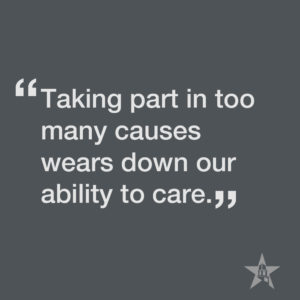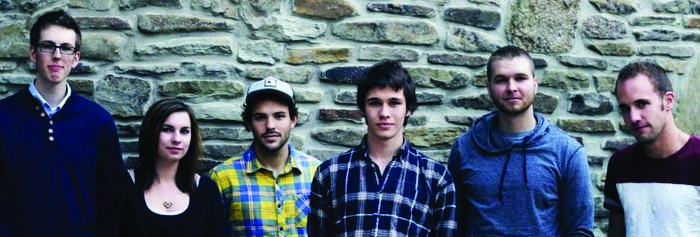Millennials are terrible at picking causes. We just throw our attention and energy into the next cause that walks by, because we have been fed the idea that all causes are important. This is entirely understandable. There are so many things marketing to our desires and ideals. Even good social movements use viral marketing and attention-grabbing techniques, trying to persuade us that they’re worth our blood, sweat, and tears. It’s hard to discern what’s worthwhile for a generation that desires to make real change in the world. We are driven and compassionate, and we want to change our broken systems, broken politics, and broken ecology. We wish we could change it all.
 Someone once told me to think carefully about what hill I want to die on. By this, they meant, “You only die once; where would you be satisfied dying? What would be okay to sacrifice for?” This metaphor provides some much needed perspective on decision making. There are many things I disagree with in my environment, but I have limited energy and time to change those things. Finding the right hill to die on is important.
Someone once told me to think carefully about what hill I want to die on. By this, they meant, “You only die once; where would you be satisfied dying? What would be okay to sacrifice for?” This metaphor provides some much needed perspective on decision making. There are many things I disagree with in my environment, but I have limited energy and time to change those things. Finding the right hill to die on is important.
Our generation has a tendency to choose causes poorly. Therefore, I want to leave you with a few things to keep in mind when you select a cause to champion.
First, keep in mind that not all causes are created equal. A Kickstarter campaign to make a giant potato salad and Black Lives Matter are about as different as campaigns can be. One changes lives and the other changes a moment on the Internet. There is no comparison. This is why Black Lives Matter makes history and a supermassive potato salad does not.
Second, apathy is a trap which deeply believing Millennials can easily step into. Taking part in too many causes wears down our ability to care. We only have so much energy for caring, and if we join too many causes that caring energy will soon be depleted. This is how being human works. No one wants an apathetic supporter. In fact, apathy will discredit the importance of the cause. Don’t become a part of something you don’t fully believe in. If you don’t fully believe in it, it’s simply not the hill for you.
 The third thing to consider when choosing a cause is whether the cause hurts people. How many people are being hurt by the words and actions of that cause? Think about it long and hard. Is it worth it? If you do join a cause that hurts people, don’t expect those who are hurt by you to understand your actions. Don’t expect anyone outside of that cause to understand. Never put your causes before people, even if it seems like those causes are for people. Find a better solution.
The third thing to consider when choosing a cause is whether the cause hurts people. How many people are being hurt by the words and actions of that cause? Think about it long and hard. Is it worth it? If you do join a cause that hurts people, don’t expect those who are hurt by you to understand your actions. Don’t expect anyone outside of that cause to understand. Never put your causes before people, even if it seems like those causes are for people. Find a better solution.
Finally, keep in mind that making no decision is still a decision. You’re still giving an answer. Saying nothing is most definitely saying something. Choosing to not participate in a cause shows others that you don’t value something. This is not a call to reject all causes. On the contrary, the drive to change things in the world may be the single best attribute of the Millennial generation. I want to encourage you to find something bigger than yourself to pour into and to make better. It would be such a waste to be divided and disconnected. So please, be thoughtful and real and find a hill where you can firmly plant your roots and grow into someone who changes the world.
Ian is a senior majoring in communication and theology.

